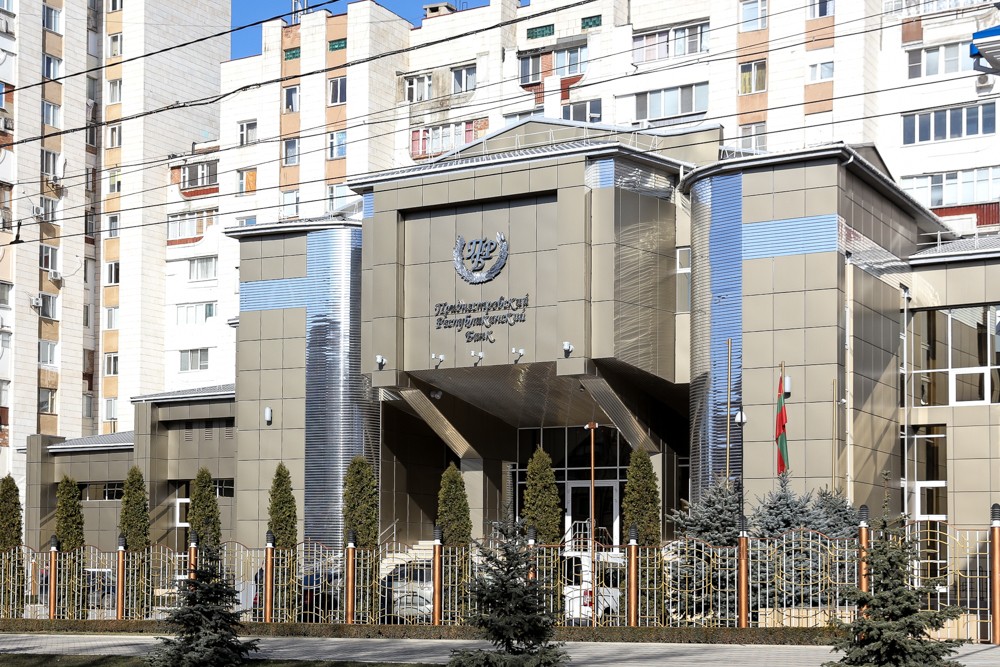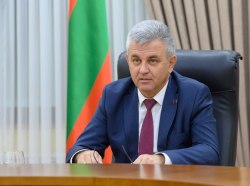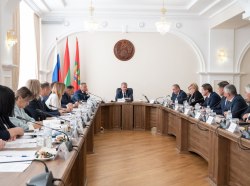Tiraspol, 20 June. /Novosti Pridnestrovya/. In a split year of its work Pridnestrovie's National Payment System (NPS) has issued over 26,000 payment cards, Alexey Kochetov, head of the NPS department at the Pridnestrovian Republican Bank (PRB), told journalists today. The payment system was launched on 1 July 2015, but it had been preceded by several years of preliminary work.
«This all started in 2013 with a concept of establishing an NPS with the use of bank cards. The system was established by the PRB together with other authorised banks and came into being in late 2013.
A processing centre was created within the concept; original software was developed to maintain the NPS's undisturbed operations. Then, on 22 May 2015, the Pridnestrovian president signed a decree regulating NPS operations. The first commercial organisation to join the system was Eximbank. Based on the agreement with the PRB, it is capable of issuing NPS cards and on 1 July the processing centre began working and first cashless transactions were made. Later, the Ipotechnyi and Sberbank banks also joined the system.
In 11 months the aggregate amount of money transactions performed in Pridnestrovie with NPS cards has totalled over 116 million roubles. NPS cards, in the meantime, can be used in Russia in all payment terminals and ATMs supporting Russia's PRO100 payment system. Pridnestrovian roubles are converted into Russian roubles automatically at the rate fixed by an issuing bank (as for 20 June it is 0.27 PMR roubles per Russian rouble in Eximbank, Sberbank and Ipotechnyi). From July 2015 to May 2016, an aggregate of 5,380 monetary operations were performed in Russia with the use of NPS bank cards at an amount of 50 million Russian roubles.
Advantages
Having the state's own national payment system may benefit both Pridnestrovie as a whole and issuing banks and card holders, as well as commercial organisations in which a customer may pay his purchases with it,
From the point of view of an ordinary citizen, the NPS card does not only have common advantages bank cards may offer, but may also have a number of additional benefits. First of all, this is convenience and security. Its holder may now avoid carrying considerable amounts of cash money and remain, at the same time, solvent almost always and everywhere and make purchases where and when it is convenient for him. The only question is the availability of special payment terminals or ATMs to withdraw money from the account.
Money can be drawn with NPS cards not only at the ATMs belonging to the issuing bank, but also at the ATMs of any other bank which has joined the system. For example, the holder of the card issued by Eximbank may withdraw money from his account, as well as perform other operations with the card at the ATMs belonging to Ipotechniy and Sberbank. In this case, however, it is necessary to pay a certain commission fee. The bank can fix its amount on its own. So, for Eximbank card holders it will be 1% when withdrawing money through the ATMs of other NPS participants and 1.5% if you decide to withdraw money at cash points.
At present there are 67 payment terminals and about 300 cash points where operations with NPS cards can be performed.
If the card is lost, it can be blocked as an ordinary credit card. Therefore, a thieve or a person who has found other person's NPS card will not be able to withdraw money with it even if he manages to fit the pin-code.
In addition, NPS card holders issued in Pridnestrovie can be used in Russia at all ATMs and payment terminals supporting the PRO100 system. As of March 2014, PRO100 cards are accepted by over 250,000 commercial organisations (about 40% of the acquiring network of Russian banks) and by 68,000 payment terminals (about 2/3 of all Russian ATMs). If the NPS card holder runs out of money in Russia, he does not have to search for a post office to receive a cash transfer — it is enough that his relatives, friends and colleagues in Pridnestrovie should top up his account.
Commercial organisations may benefit from the spread of NPS cards as well. First of all, this applies to non-cash transactions. Thus, according to Kochetov, it was estimated that the average sum of a receipt when paying with a card is 20% higher than even in those cases when the man pays cash. Marketing specialists explain this situation by the fact that the man does not feel the process of spending money when paying with a card. There is a common practice, however, when trading organisations prompt their clients to use cards by proposing various bonuses and discounts, which, in turn, is beneficial for card holders.
Besides, it is more advantageous for commercial organisations to have one payment terminal accepting the cards of all NPS participants that to have a terminal for each issuing bank. After a year since the launch of the system, almost 500 NPS terminals have been installed in the republic.
Taken altogether, this all helps increase the number of cashless transactions, which means, in turn, an increase in the transparency of Pridnestrovie's turnover, exclusion of various grey schemes of tax evasion.
«The tax base increases, as do budget receipts and funding of social programmes," says Alexey Kochetov.
Besides, a gradual increase in cashless transactions is beneficial for the state, as the PRB reduces its spending on money emission. So, the PRB quarterly spends about 449,000 roubles to maintain the NPS and about 721,000 roubles for maintaining the current money circulation. However, as the number of cashless operations is growing, the latter amount will diminish, but NPS maintenance costs will not go up.
Tariff policy
According to Kochetov, the central bank is pursuing a rather liberal tariff policy to encourage a rapid development of the project. In particular, issuing banks do not make any deductions to the PRB at the time of issuing the card or during the card’s further use. Besides, the central bank defrayed a considerable part of cost for the launch of the system, establishing the joint emission host.
This is the part of a software package which issues cards. In doing so, we shifted these costs from banks on us; otherwise each bank would have to purchase this emission host," noted Alexey Kochetov.
As a result, possessing the NPS card is relatively cheap. It can be issued free of charge, for example, as part of a salary project, or for a paltry sum of money. Monthly payments to the bank, according to Kochetov, is relatively small in comparison with other payment systems. For example, in Eximbank the amount of these deductions varies from 2 to 3 roubles depending on a category of a card holder.
At the same time, the more cards will be issued the lower the cost of their servicing will be, which is why this sum may be adjusted to the lower side.
No general support
In compliance with amendments to the Trade Regulations submitted by the government, NPS payment terminals should be installed in each trading organisation with a trading space of over 50 sq m or whose annual turnover exceeds 6.6 million roubles. Not all organisations, however, have fulfilled this requirement. In particular, the country's biggest retail chain Sheriff has not installed NPS terminals in its branches.
This is probably due to the fact that Sheriff's retail outlets accept the most popular payment card in our country, Raduga, issued by Agroprombank, which did not agree to join the NPS. In this way the retail chain protects acquiring bank against competition. Such a suggestion was particularly expressed in December 2105 by Dmitry Boltrushko, then deputy minister of economic development.
«The Sheriff retail chain, affiliated with Agroprombank, accepts only Raduga payment cards. These companies, therefore, are not interested to accept other banks' cards in their chain as in this case Agroprombank's market share will shrink," he said during an information marathon on TV.
Were terminals installed in Sheriff's retail outlets, according to Kochetov, this would give an additional impetus to the development of the NPS in the PMR.
The turnover would considerably increase at the expanse of operations in this retail chain. It is hard to suppose to which extent, but I think that considerably," said Kochetov.
Prospects
The NPS is still a young project at an early stage of its development. In the short run the PRB plans to add an opportunity of pegging several accounts to the same card, including in various currencies, and not only one as today.
Besides, Pridnestrovie's central bank hopes to integrate its NPS into Russia's national payment system Mir.
This is especially relevant, taking into account that Russia's Sberbank has stopped issuing PRO100 cards. According to the PRB, they will be still in service for at least two or three years, but then, in any case, PRO100 cards must be replaced. Alexey Kochetov is sure that sooner or later Pridnestrovie will manage to enter Russia's national payment system. According to him, this is technically implementable, but impossible so far due to peculiarities of the Russian legal system.
«Amendments must be made to the Russian legislation so that the foreign payment system, such as ours, could join Russia's national system," said Kocvhetov.
The PRB is also seeking mechanisms of integrating the NPS into international systems, such as Visa and Mastercard. However, due to Pridnestrovie's unrecognised international status, this requires the approval of the National Bank of Moldova, which initiated the PMR's banking blockade and consequently it is very unlikely to receive its approval in the short term.
Besides, with the lapse of time Pridnestrovie's NPS cards will be able to be used for making payments in internet banks. According to Kochetov, this option is not available now as e-commerce is not well presented in the Pridnestrovian market, but with time NPS card holders will enjoy such an opportunity.
«Technologically, our processing centre can perform authentication operations, using the requisites of the payment card. In other words, it has an engine for internet shops," he said.
Another promising area is the use of NPS cards in other projects. According to Kochetov, some Russian regions have been implementing medical insurance programmes based on similar cards; cards can be used to pay the fare in public transport or as an electronic ID.
The PRB's central aim is to enhance the system's convenience for ordinary users. More ATMs and payment terminals will be installed to that effect. It is estimated that the number of NPS card holders will reach 45,000−50,000 by the end of this year.








